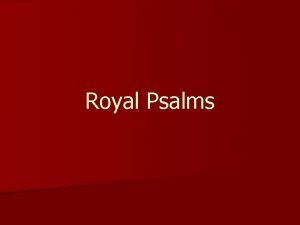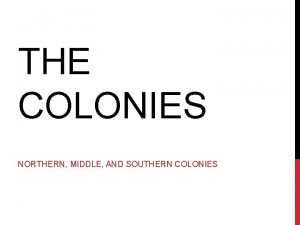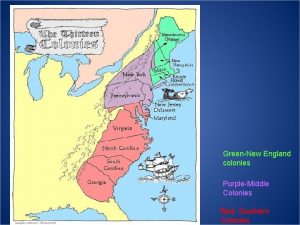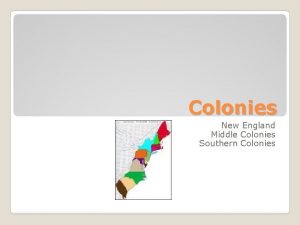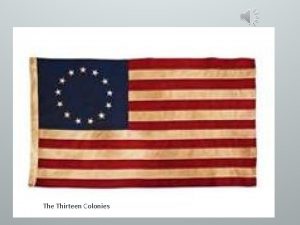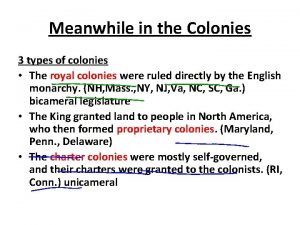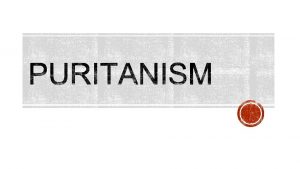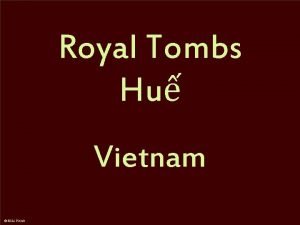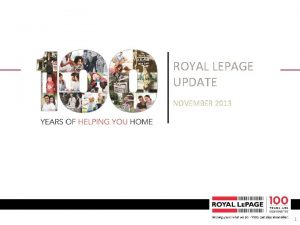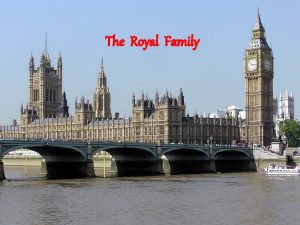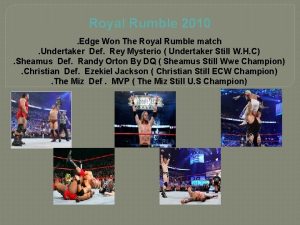The American Colonies Types of Colonies Royal Colonies







































- Slides: 39

The American Colonies

Types of Colonies • Royal Colonies – King chooses a royal governor to run the colony » Example: Massachusetts & Virginia

Types of Colonies • Proprietary Colonies –King gifts land to an individual or group » Examples: Pennsylvania & Maryland

Types of Colonies • Charter – King grants charters to establish colony – Colonies governed themselves » Examples: Connecticut & Rhode Island

Southern Colonies

First Attempts • Roanoke Colony – Sir Walter Raleigh, favorite of Queen Elizabeth I, sent a group of colonists to the island of Roanoke, off the northern coast of North Carolina. – Colonists mysteriously disappeared while John White was away in England.

Virginia (1607) • Jamestown • 1 st permanent settlement mostly males (indentured servants and treasure hunters) • 60/900 colonists survived • Ruled by John Smith • Founded by the Virginia Company – Joint-stock company: organized to raise money by selling stocks/shares to investors – Becomes a royal colony House of Burgesses (1619)-22 representatives called burgesses met to outline laws for the colony

– Maryland (1634) • Founded by George Calvert as an area of religious freedom for Catholics • Was also established for trade, finding precious metals and to locate a water passage across the continent • Proprietary Colony

Maryland Act of Toleration • 1649 • Granted freedom of worship for all Catholics • Symbolic beginning of freedom of religion

– North Carolina (1653) • • • Founded by a group of proprietors: business venture Settlers from Virginia Farming, trade and profit Anglican Becomes a royal colony – South Carolina (1670) • • • Founded by a group of proprietors Settlers from France, England, and Africa Food crops Anglican Proprietary to royal – Georgia (1733) • Founded by General James Oglethorpe as a haven for debtors and convicts intended to protect colonies from Spanish and French invasions • Slow economic growth farmed, harvested lumber and traded furs

The Charter of Carolina 1663

Bacon’s Rebellion • Virginia, 1676 • Cause: Small farmers treated unfairly; wealthy landowners paid fewer taxes and received many benefits • Rebellion was led by Nathaniel Bacon • Failed but resulted in the need for representation in government for the “common man”

New England Colonies

Massachusetts • Pilgrims (Plymouth) (1620) • - led by William Bradford – Separatists • wanted to separate from the Church of England – Mayflower Compact • 41 men drew up the agreement to outline fair and equal laws for the colony; signed on the Mayflower

Massachusetts Puritans • Purify and reform Anglican Church • Massachusetts Bay Colony • Strict religious beliefs; radical • John Winthrop: City upon a Hill

– New Hampshire (1630) • • • John Mason English and Scots-Irish settlers Economic freedom Settled for religious freedom Escape for those constricted by harsh religious and economic rules of the Puritans • Royal Colony

– Rhode Island (1636) • Founded by Roger Williams after being exiled by Puritans in Massachusetts settled in Providence • Religious freedom: most religiously tolerant colony – Connecticut (1636) • Founded by Thomas Hooker after being asked to leave Massachusetts for dissenting with Puritan leaders. • Settled by the Dutch for economic freedom and the English for religious freedom. • Agriculture and trade

Middle Colonies

– New York (1626) • • • Peter Minuit Dutch (Netherlands), taken over by English Trade and profits Anglican Proprietary to royal colony – New Jersey (1660) • Established by Dutch and Swedish but became English. • Land given to friend of the King, Lord Berkely • Proprietary to royal colony – Delaware (1638) • • Peter Minuit Dutch, Swedish and English Farming, trade and profits Proprietary Colony

Pennsylvania (1682) – – William Penn Proprietary Colony Quakers Home to many European Immigrants: Swedish, Dutch, English, Scots-Irish and German - Allowed for religious freedom • Quakers – Equality and all possessed “Inner Light”

Ethnic and Religious Diversity

Discrimination in Massachusetts • Salem Witch Trials (1692 -3): series of trials and hangings of people accused of witchcraft

Discrimination in Massachusetts • Anne Hutchinson: Puritan spiritual advisor that was banished for her criticism of the colony’s ministers. Fled to Rhode Island. • Roger Williams: Banished for speaking out against the Plymouth church and the colony for taking Indian land without buying it. Fled to & founded Rhode Island.

Discrimination • African Americans – Slaves • Native Americans – Pushed off of land by settlers

Religious Tolerance • Roger Williams Providence, Rhode Island • Pennsylvania – English Quakers – German Lutherans – Scotch-Irish Presbyterians – Swiss Mennonites • New York linguistic and cultural diversity – First synagogue (Jewish)

Colonial Economy

Economic Diversity: -South= Agriculture -North = Commerce -Towns and cities develop along water

Economy • Mercantilism: A system where England exploited raw materials produced by the colonies to become rich. – Economic policy – Way for the Mother Country to get rich – Export more than you import, become selfsufficient Effect= Britain creates rules for colonial trade

Southern Economy • John Rolfe and tobacco: Rolfe discovered new ways to cultivate tobacco – Virginia, Maryland, NC • Plantations develop – Need for labor – Indentured servants • Agree to work for landowner for 4 -7 years, then given freedom – slavery

Southern Plantation Systems • Exported cash crops to make money • Creates: (1) Large farms around rivers (2) Need for lots of labor (3) Wealthy class of plantation owners

New England • Commerce • Port cities – Boston • Shipbuilding • Fishing

Immigration to Colonies • Immigrant population increases due to religious freedom and economic opportunities (German, Scotch-Irish, Dutch) • Came in search of prosperity and wealth and to avoid religious persecution • Voluntary and involuntary immigration

Slave Trade • African slave trade flourished by 1700 s • Slaves endured a harsh voyage: Middle Passage • Widespread use in Southern colonies

Slave Trade Ship


Colonial Government • Britain allows the colonies to govern themselves – Salutary neglect: Because Britain was thriving economically in large part due to their exploitation of the colonies, they allowed the colonies to govern themselves. • Colonial legislatures hold the power

Self-Government & the Colonies • Enlightenment (1600 s) • John Locke (1632 -1704) – Two Treatises on Government (1690) • Natural rights: life, liberty, property • These rights can’t morally be taken away by government • Social contract theory – Implied contract between government and citizens – People submit themselves to follow the law for the common good and to cultivate civic virtue – Government fails= replace government

Self-Government & the Colonies • House of Burgesses (1619) • First elected body in New World • Citizens should have a voice • Created laws for the colony of Jamestown • Mayflower Compact (1620) • Document drafted by Pilgrims • Created an elected legislature • Government received power from the people of the colony • Demonstrates desire to be ruled by local government instead of England

Self-Government & the Colonies – Town meetings • Representative government • Local citizens met to discuss and vote on issues • Belief in democratic ideals • Town meetings were more popular in the North because there were more towns there than in the South – Fundamental Orders of Connecticut (1639) • Written body of laws for the colony • Government’s power came only from the “free consent of the people” • Set limits on what government could do
 North american colonies
North american colonies The american colonies emerge
The american colonies emerge Hình ảnh bộ gõ cơ thể búng tay
Hình ảnh bộ gõ cơ thể búng tay Slidetodoc
Slidetodoc Bổ thể
Bổ thể Tỉ lệ cơ thể trẻ em
Tỉ lệ cơ thể trẻ em Voi kéo gỗ như thế nào
Voi kéo gỗ như thế nào Chụp phim tư thế worms-breton
Chụp phim tư thế worms-breton Hát lên người ơi
Hát lên người ơi Các môn thể thao bắt đầu bằng tiếng đua
Các môn thể thao bắt đầu bằng tiếng đua Thế nào là hệ số cao nhất
Thế nào là hệ số cao nhất Các châu lục và đại dương trên thế giới
Các châu lục và đại dương trên thế giới Công thức tiính động năng
Công thức tiính động năng Trời xanh đây là của chúng ta thể thơ
Trời xanh đây là của chúng ta thể thơ Mật thư anh em như thể tay chân
Mật thư anh em như thể tay chân 101012 bằng
101012 bằng Phản ứng thế ankan
Phản ứng thế ankan Các châu lục và đại dương trên thế giới
Các châu lục và đại dương trên thế giới Thơ thất ngôn tứ tuyệt đường luật
Thơ thất ngôn tứ tuyệt đường luật Quá trình desamine hóa có thể tạo ra
Quá trình desamine hóa có thể tạo ra Một số thể thơ truyền thống
Một số thể thơ truyền thống Cái miệng bé xinh thế chỉ nói điều hay thôi
Cái miệng bé xinh thế chỉ nói điều hay thôi Vẽ hình chiếu vuông góc của vật thể sau
Vẽ hình chiếu vuông góc của vật thể sau Nguyên nhân của sự mỏi cơ sinh 8
Nguyên nhân của sự mỏi cơ sinh 8 đặc điểm cơ thể của người tối cổ
đặc điểm cơ thể của người tối cổ Thế nào là giọng cùng tên
Thế nào là giọng cùng tên Vẽ hình chiếu đứng bằng cạnh của vật thể
Vẽ hình chiếu đứng bằng cạnh của vật thể Vẽ hình chiếu vuông góc của vật thể sau
Vẽ hình chiếu vuông góc của vật thể sau Thẻ vin
Thẻ vin đại từ thay thế
đại từ thay thế điện thế nghỉ
điện thế nghỉ Tư thế ngồi viết
Tư thế ngồi viết Diễn thế sinh thái là
Diễn thế sinh thái là Các loại đột biến cấu trúc nhiễm sắc thể
Các loại đột biến cấu trúc nhiễm sắc thể Số nguyên tố là số gì
Số nguyên tố là số gì Tư thế ngồi viết
Tư thế ngồi viết Lời thề hippocrates
Lời thề hippocrates Thiếu nhi thế giới liên hoan
Thiếu nhi thế giới liên hoan ưu thế lai là gì
ưu thế lai là gì Hổ sinh sản vào mùa nào
Hổ sinh sản vào mùa nào










































